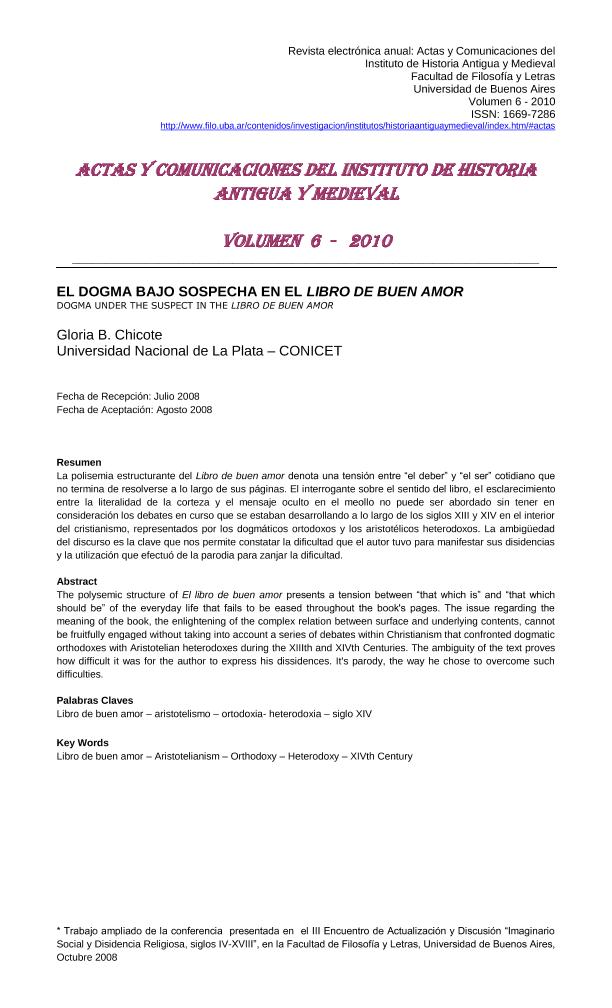Mostrar el registro sencillo del ítem
dc.contributor.author
Chicote, Gloria Beatriz

dc.date.available
2019-08-21T18:12:21Z
dc.date.issued
2010-04
dc.identifier.citation
Chicote, Gloria Beatriz; El dogma bajo sospecha en el Libro del Buen Amor; Universidad de Buenos Aires. Facultad de Filosofía y Letras. Instituto de Historia Antigua y Medieval; Actas y Comunicaciones del Instituto de Historia Antigua y Medieval; 6; 4-2010; 7
dc.identifier.issn
1669-7286
dc.identifier.uri
http://hdl.handle.net/11336/81930
dc.description.abstract
La polisemia estructurante del Libro de buen amor denota una tensión entre “el deber” y “el ser” cotidiano que no termina de resolverse a lo largo de sus páginas. El interrogante sobre el sentido del libro, el esclarecimiento entre la literalidad de la corteza y el mensaje oculto en el meollo no puede ser abordado sin tener en consideración los debates en curso que se estaban desarrollando a lo largo de los siglos XIII y XIV en el interior del cristianismo, representados por los dogmáticos ortodoxos y los aristotélicos heterodoxos. La ambigüedad del discurso es la clave que nos permite constatar la dificultad que el autor tuvo para manifestar sus disidencias y la utilización que efectuó de la parodia para zanjar la dificultad.
dc.description.abstract
The polysemic structure of El libro de buen amor presents a tension between “that which is” and “that which should be” of the everyday life that fails to be eased throughout the book's pages. The issue regarding the meaning of the book, the enlightening of the complex relation between surface and underlying contents, cannot be fruitfully engaged without taking into account a series of debates within Christianism that confronted dogmatic orthodoxes with Aristotelian heterodoxes during the XIIIth and XIVth Centuries. The ambiguity of the text proves how difficult it was for the author to express his dissidences. It's parody, the way he chose to overcome such difficulties.
dc.format
application/pdf
dc.language.iso
spa
dc.publisher
Universidad de Buenos Aires. Facultad de Filosofía y Letras. Instituto de Historia Antigua y Medieval
dc.rights
info:eu-repo/semantics/openAccess
dc.rights.uri
https://creativecommons.org/licenses/by-sa/2.5/ar/
dc.subject
Libro de Buen Amor
dc.subject
Aristotelismo
dc.subject
Ortodoxia
dc.subject
Heterodoxia
dc.subject
Siglo Xiv
dc.subject.classification
Estudios Generales del Lenguaje

dc.subject.classification
Lengua y Literatura

dc.subject.classification
HUMANIDADES

dc.title
El dogma bajo sospecha en el Libro del Buen Amor
dc.title
Dogma under the suspect in the Libro de Buen Amor
dc.type
info:eu-repo/semantics/article
dc.type
info:ar-repo/semantics/artículo
dc.type
info:eu-repo/semantics/publishedVersion
dc.date.updated
2019-06-11T15:34:46Z
dc.journal.volume
6
dc.journal.pagination
7
dc.journal.pais
Argentina

dc.journal.ciudad
Buenos Aires
dc.description.fil
Fil: Chicote, Gloria Beatriz. Universidad Nacional de La Plata; Argentina. Consejo Nacional de Investigaciones Científicas y Técnicas; Argentina
dc.journal.title
Actas y Comunicaciones del Instituto de Historia Antigua y Medieval
dc.relation.alternativeid
info:eu-repo/semantics/altIdentifier/url/http://www.filo.uba.ar/contenidos/investigacion/institutos/historiaantiguaymedieval/index.htm/actasycomunicacion/volumen6-2010/Indice.html
dc.relation.alternativeid
info:eu-repo/semantics/altIdentifier/url/http://revistascientificas.filo.uba.ar/index.php/AcHAM/article/view/2667
dc.relation.alternativeid
info:eu-repo/semantics/altIdentifier/doi/http://dx.doi.org/10.340962Faciham.v6.2667
Archivos asociados
